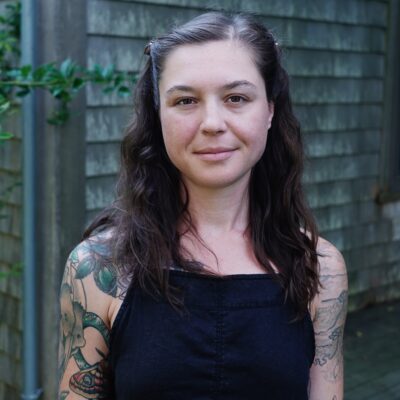Student Spotlight: Oona Cullen

September 16, 2024
Oona Cullen is a doctoral candidate in English language and literature with minors in feminist, gender, and sexuality studies and media studies from Nantucket, Massachusetts. She earned her B.A. in literature from Bard College and her M.A. in English language and literature from Cornell University and now studies questions of embodiment, narrative, and form as they relate to experiences of race and gender under the guidance of Nick Salvato at Cornell.
What is your area of research and why is it important?
As a scholar of media and materials, tangible objects, and human bodies, my research largely centers around questions of embodiment, narrative, and form, particularly as they relate to performances and experiences of race and gender. Traditionally—and reasonably—references to the performative aspects of gendered and racialized embodiment have centered on the violences and boundaries these performances require, and the stereotypes and tropes these violences and boundaries create and reinforce. By engaging with feminist materialisms and women-of-color and Black feminist epistemologies, my research seeks to re-imagine embodiment more expansively, in turn revealing new and more inclusive ways of understanding and conceiving of “femininity”—beyond bioessentialism—which can celebrate and encompass vastly differing embodied experiences of race and gender within the unity it presents. This is the most important aspect of my research: its capacity to reappropriate the idea of “the feminine” for a broader swathe of persons across a broader spectrum of embodied experiences of femininity.
What are the larger implications of this research?
The social impact of my work, as is the case with much of the work we do in the humanities, is in its capacity to redefine the terms of human experience; in this case, the experience of human embodiment. If, as we must, we acknowledge the extraordinary diversity of embodied experiences which occur under the umbrella of “femininity”—across spectrums of gender, sex, and race—the definitional question of what we really mean when we invoke “femininity” becomes an opportunity to observe and imagine new ways of being feminine, while also acknowledging the vast diversity of experiences which occur under that umbrella term. Ultimately, I see this as a decolonial project, one which approaches the arbitrary hierarchies and implied boundaries of liberal humanist thought which undergirds so much of the intellectual foundation of the humanities and seeks ultimately to move beyond them.
What does it mean to you to have received the Deanne Gebell Gitner ’66 and Family Annual Prize for Teaching Assistants?
It is a deep honor to have been selected as a recipient of the Gitner Prize. It felt like an acknowledgement that, though the work I do as a teacher is small-scale and intimate, it is ultimately important and impactful. I believe profoundly in the work we do in the humanities, and the ways of thinking that work makes possible. As a teacher, I aim to help my students develop their skills as critical thinkers through the avenues of reading closely and writing analytically in the hope of helping them think more deeply and critically about the world around them and their own communications within different spheres. Receiving the Gitner Prize felt like a profound acknowledgement of the value of that work.
What did this award allow you to do that you might not have been able to otherwise?
Beyond the professional opportunities that receiving the Gitner Prize will surely provide, the award money which attended the prize really helped in easing some of the financial anxiety of being a Ph.D. candidate with a mortgage.
What are your hobbies or interests outside of your research or scholarship?
I’m an avid cook, baker, knitter, and reader-for-pleasure. I love hiking and being in nature, doing yoga, riding motorcycles, swimming in the ocean (easier when I’m home on Nantucket), and hosting friends for gatherings of all kinds (usually either dinner parties, dance parties, or gaming get-togethers).
Why did you choose Cornell to pursue your degree?
I was very attracted by the freedom and intimacy of the Department of Literatures in English, which has really allowed me to do the kind of intensely interdisciplinary and politically engaged work I’m interested in doing. The community of incredibly smart and intentional scholars I’ve met here has been the defining pleasure of being at Cornell, though. I have learned so much from being in classes— and just having personal dialogue— with the faculty and other graduate students.
